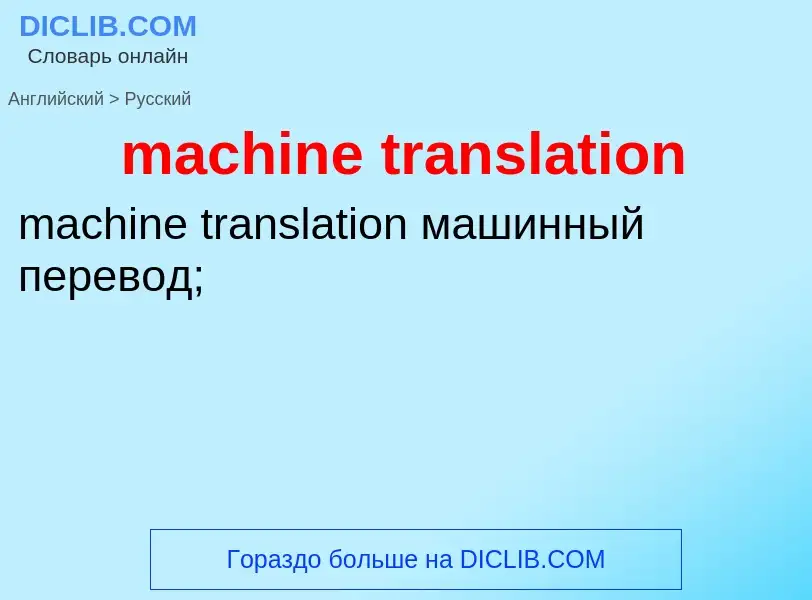Traducción y análisis de palabras por inteligencia artificial ChatGPT
En esta página puede obtener un análisis detallado de una palabra o frase, producido utilizando la mejor tecnología de inteligencia artificial hasta la fecha:
- cómo se usa la palabra
- frecuencia de uso
- se utiliza con más frecuencia en el habla oral o escrita
- opciones de traducción
- ejemplos de uso (varias frases con traducción)
- etimología
machine translation - traducción al Inglés
[mə'ʃi:n|()trænz'leiʃ(ə)n-{mə'ʃi:n}()træns'leiʃ(ə)n]
вычислительная техника
автоматизированный
машинный перевод
Definición
1) Передача на дальнее расстояние речи, музыки, изображения средствами радио или телевидения, осуществляемая непосредственно с места действия.
2) То, что передается таким способом.
Wikipedia
Machine translation, sometimes referred to by the abbreviation MT (not to be confused with computer-aided translation, machine-aided human translation or interactive translation), is a sub-field of computational linguistics that investigates the use of software to translate text or speech from one language to another.
On a basic level, MT performs mechanical substitution of words in one language for words in another, but that alone rarely produces a good translation because recognition of whole phrases and their closest counterparts in the target language is needed. Not all words in one language have equivalent words in another language, and many words have more than one meaning.
Solving this problem with corpus statistical and neural techniques is a rapidly growing field that is leading to better translations, handling differences in linguistic typology, translation of idioms, and the isolation of anomalies.
Current machine translation software often allows for customization by domain or profession (such as weather reports), improving output by limiting the scope of allowable substitutions. This technique is particularly effective in domains where formal or formulaic language is used. It follows that machine translation of government and legal documents more readily produces usable output than machine translation of conversation or less standardised text.
Improved output quality can also be achieved by human intervention: for example, some systems are able to translate more accurately if the user has unambiguously identified which words in the text are proper names. With the assistance of these techniques, MT has proven useful as a tool to assist human translators and, in a very limited number of cases, can even produce output that can be used as is (e.g., weather reports).
The progress and potential of machine translation have been much debated through its history. Since the 1950s, a number of scholars, first and most notably Yehoshua Bar-Hillel, have questioned the possibility of achieving fully automatic machine translation of high quality.

![沒有進入}}" from machine translation in [[Bali, Indonesia]]. The broken Chinese sentence sounds like "there does not exist an entry" or "have not entered yet". 沒有進入}}" from machine translation in [[Bali, Indonesia]]. The broken Chinese sentence sounds like "there does not exist an entry" or "have not entered yet".](https://commons.wikimedia.org/wiki/Special:FilePath/Machine translation in Bali.jpg?width=200)
![鸡枞}}" (''[[Macrolepiota albuminosa]]'') being rendered as "Wikipedia". 鸡枞}}" (''[[Macrolepiota albuminosa]]'') being rendered as "Wikipedia".](https://commons.wikimedia.org/wiki/Special:FilePath/Stir Fried Wikipedia.jpg?width=200)
